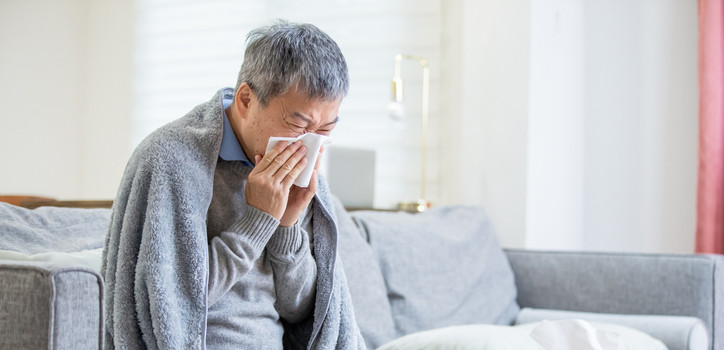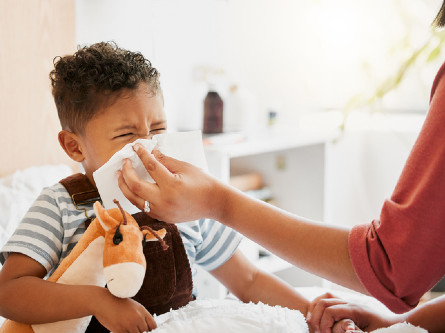
During flu season, influenza cases rise, and the virus is easily spread. Other viruses such as RSV are common as well. Learn to spot the differences in these viruses, tips for how to prevent them and what to do when you or a loved one is experiencing symptoms.
What is the flu?
Influenza, or the flu, is a virus that infects the respiratory system, throat, nose and other parts of the body. The flu is contagious, and cases can range from mild to severe.
What is flu season and when is it?
Flu season is the time of year when the flu virus is most active, and more people get infected. Flu season in the U.S. is from October to April, with peak flu activity usually from December to February.
What are flu symptoms?
Common flu symptoms can include:
- Fever
- Chills
- Sore throat
- Runny or stuffy nose
- Muscle and body aches
- Headaches
- Tiredness
- Vomiting and diarrhea (this is more common in children than adults)
Severe flu symptoms can include:
- Chest pain and difficulty breathing
- Dehydration from vomiting or diarrhea
- Feeling lightheaded
- Skin and lips turning blue
Learn more about the flu virus
How is the flu spread?
The flu can spread through the air or contact with an infected person. You can also get it by touching contaminated surfaces. If you have the flu, you are most contagious in the first three to four days of experiencing symptoms. It’s also possible to spread the flu before you have symptoms, and up to seven days after getting sick. Children are the most likely to catch and spread the flu virus.
How is the flu treated?
While there are a few medications available to help with flu symptoms, the body’s natural defenses can take time to fight the virus completely. The best way to treat the flu is through prevention, by getting an annual flu shot. The flu vaccine lowers the risk of infection and helps prevent the virus from spreading to others. If you end up getting influenza after receiving the flu vaccine, the illness is generally less severe. Other ways to help prevent infection include:
- Proper hygiene such as frequent hand washing
- Avoiding contact with sick people
- Wearing a mask in crowded areas
What should I know about the flu vaccine?
The flu vaccine is a shot that is given once a year (except for young children who get two doses the first time they are vaccinated) and updated annually before each flu season begins. The flu vaccine is a safe and effective way to help prevent infection in yourself and the risk of spreading to others. The vaccine is available at most primary care clinics, medical centers and local pharmacies. They are usually covered by insurance, and many free clinics are offered.
Learn more about the flu vaccine and where you can get it
What do I do if I think I have the flu?
There are a few ways to treat the flu depending on how severe your symptoms are. If you are experiencing flu symptoms:
- Stay home to prevent spreading to others. If you do need to leave home, wear a mask.
- Get plenty of rest.
- Stay hydrated by drinking fluids such as water and electrolyte drinks.
- Taking a pain reliever as directed can help with some symptoms such as body aches and headaches.
- Ask your doctor about antiviral medications, such as Tamiflu, which can help fight the flu virus.
- If you are experiencing severe symptoms, contact your primary care provider. A telehealth appointment is a quick and easy way to receive initial care for the flu.
Get started with UC Davis Telehealth Express Care
What is RSV?
RSV stands for respiratory syncytial virus. It is an infectious disease that affects the respiratory system. It can also lead to serious conditions such as bronchiolitis and pneumonia. While adults can get RSV, it most commonly affects young children. Children and older adults are also at higher risk of severe RSV infection than young adults. RSV is most dangerous in children under age two and older adults.
What is RSV season and when is it?
RSV season is the time of year when the RSV virus is most active, and more people get infected. RSV season in the U.S. typically starts in the fall and winter months, usually from September to April. The peak of RSV activity varies, but is often in December or January.
What are the symptoms of RSV?
Symptoms of RSV may not be noticeable at first. Early symptoms of RSV include:
- Runny nose
- Decrease in appetite
- Coughing
Severe symptoms of RSV include:
- Wheezing and difficulty breathing
- Breathing very fast
- Possibility that the child’s ribs stick out because they are taking such deep breaths
- Turning blue around the lips
If your child is experiencing these symptoms, it is recommended to seek care immediately.
How is RSV spread?
RSV is contagious. It can be spread through sneezing, coughing or when you touch a contaminated surface and then touch your mouth or eyes.
How is RSV treated?
Antiviral and antibiotic medications do not work in treating RSV. Current medical treatment includes symptom relief and ensuring the patient is well hydrated and has enough oxygen flow. Severe RSV treatment may include intravenous (IV) fluids or supplementary oxygen.
Is there a vaccine for RSV?
Yes, there are vaccines for RSV that decrease risk of infection and spread. An RSV vaccine is recommended before the start of RSV season for:
- All children younger than 8 months
- Children 8–19 months with risk factors
- Adults during pregnancy at 32–36 weeks gestational age
- All adults 75 years and older
- Adults 50–74 years with risk factors
To get the vaccine, contact your or your child’s primary care provider.
How can parents protect children from RSV?
In addition to the vaccine, there are other steps parents can take to help decrease risk of RSV infection in their children:
- Avoid contact with others who are sick.
- Wash your hands and your child’s hands often, for at least 20 seconds each time.
- Clean and disinfect surfaces that people frequently touch, such as doorknobs and mobile devices.
- Cover coughs and sneezes.
Sign up for our Health Highlights e-newsletter
This post was medically reviewed by Chief of Pediatric Infectious Diseases Dean Blumberg.




